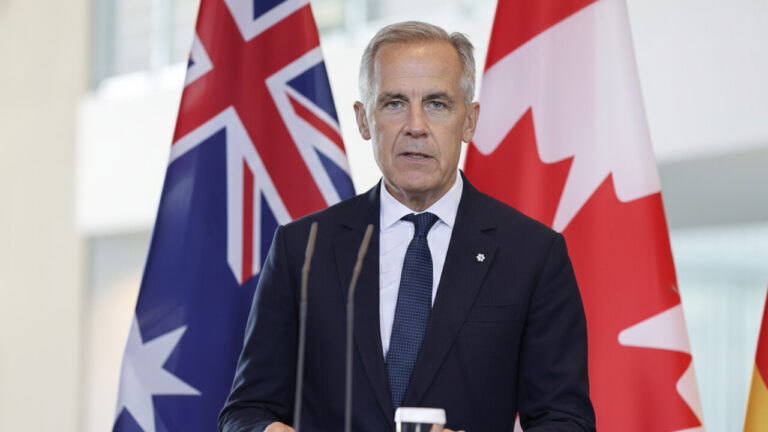
Joshua Thomson
Joshua is CANZUK International's Senior Associate
for Eastern Canada based in Saint John, NB
The Director-General of Australia’s Office of National Intelligence, Andrew Shearer, recently issued a stark warning about an “emerging axis” of countries – including China, Iran, and North Korea – providing critical support to Russia.
This deepening alliance, he stated, is a “profoundly troubling strategic development” with direct implications for global stability and Western security efforts, including those of the CANZUK nations.
Speaking at a conference in Canberra, Shearer noted that the scale of support Russia receives, particularly from China, has been underestimated. China’s economic, diplomatic, and dual-use technological support has kept Russian forces in the field, despite extensive Western sanctions and diplomatic pressure.
Alongside China’s backing, Iran’s provision of drones and North Korea’s reported deployment of missiles and soldiers to Russia mark an unprecedented expansion of Moscow’s support network. These actions have enabled Russian forces to sustain their presence in Ukraine.
Speaking at a conference in Canberra, Shearer noted that the scale of support Russia receives, particularly from China, has been underestimated. China’s economic, diplomatic, and dual-use technological support has kept Russian forces in the field, despite extensive Western sanctions and diplomatic pressure.
Alongside China’s backing, Iran’s provision of drones and North Korea’s reported deployment of missiles and soldiers to Russia mark an unprecedented expansion of Moscow’s support network. These actions have enabled Russian forces to sustain their presence in Ukraine.
Australia, a member of the Five Eyes intelligence alliance alongside the United States, the United Kingdom, Canada, and New Zealand, now faces a new dimension of geopolitical threats stemming from these alliances. The mutual defence pact recently ratified between Russia and North Korea, for example, formalises a “comprehensive strategic partnership” obliging each country to provide immediate military support to the other if attacked. This partnership, which was signed earlier this year between Russian President Vladimir Putin and North Korean leader Kim Jong Un, represents one of the strongest ties between the two countries since the Cold War.
The rise of this Russia-China-North Korea axis and its broad-reaching implications underscore the urgent need for enhanced CANZUK collaboration. The partnership between Canada, Australia, New Zealand, and the United Kingdom can play a crucial role in countering these threats through coordinated diplomatic, intelligence, and security efforts. These nations share not only a language and legal heritage but also common democratic values and a commitment to upholding international stability and the rule of law.
As the Group of Seven (G7) countries and allies, including Canada, South Korea, Australia, and New Zealand, call North Korea’s military assistance to Russia a “dangerous expansion of the conflict,” CANZUK countries are uniquely positioned to lead Western efforts in curbing the influence of this axis. By working in close alignment with each other and expanding intelligence-sharing capabilities, CANZUK members can enhance their ability to counteract hybrid threats, such as cyber warfare and information manipulation, that these countries are likely to employ.
Further, diplomatic cooperation through CANZUK can amplify the region’s collective voice in forums like the United Nations and the G7, making it clear that aggression from authoritarian regimes will not go unanswered.
Australia’s commitment to bolstering its strategic alliances is evident in its robust membership within the Five Eyes intelligence community.
A fortified CANZUK alliance would not only support these existing frameworks but also bring an added layer of support specifically for CANZUK members in responding to shared security concerns.
The rise of this Russia-China-North Korea axis and its broad-reaching implications underscore the urgent need for enhanced CANZUK collaboration. The partnership between Canada, Australia, New Zealand, and the United Kingdom can play a crucial role in countering these threats through coordinated diplomatic, intelligence, and security efforts. These nations share not only a language and legal heritage but also common democratic values and a commitment to upholding international stability and the rule of law.
As the Group of Seven (G7) countries and allies, including Canada, South Korea, Australia, and New Zealand, call North Korea’s military assistance to Russia a “dangerous expansion of the conflict,” CANZUK countries are uniquely positioned to lead Western efforts in curbing the influence of this axis. By working in close alignment with each other and expanding intelligence-sharing capabilities, CANZUK members can enhance their ability to counteract hybrid threats, such as cyber warfare and information manipulation, that these countries are likely to employ.
Further, diplomatic cooperation through CANZUK can amplify the region’s collective voice in forums like the United Nations and the G7, making it clear that aggression from authoritarian regimes will not go unanswered.
Australia’s commitment to bolstering its strategic alliances is evident in its robust membership within the Five Eyes intelligence community.
A fortified CANZUK alliance would not only support these existing frameworks but also bring an added layer of support specifically for CANZUK members in responding to shared security concerns.
Heading photo: Free Malaysia Today under Creative Commons License Attribution 4.0 International
Share this:
Facebook
Twitter
LinkedIn
WhatsApp
Email





